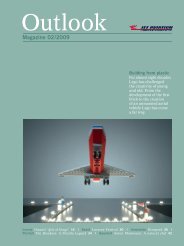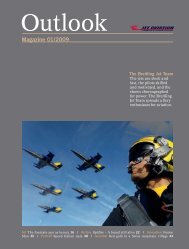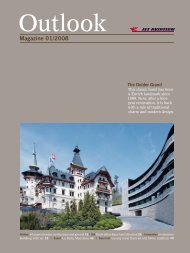profession: pilot career: actor - Jet Aviation
profession: pilot career: actor - Jet Aviation
profession: pilot career: actor - Jet Aviation
Create successful ePaper yourself
Turn your PDF publications into a flip-book with our unique Google optimized e-Paper software.
The Richterich family had known Herzog<br />
& de Meuron before they were famous<br />
and had commissioned them to build<br />
a warehouse in Laufen in 1987 and then a<br />
packaging and distribution plant across<br />
the border in France in 1993. These<br />
structures became two of the most visited<br />
industrial buildings in Europe and helped<br />
to launch the architects’ international<br />
<strong>career</strong>s. Ricola recently had them design<br />
another building, a glass marketing<br />
facility across from the management buil-<br />
ding.<br />
Ricola’s administration buildings are<br />
filled with artwork. The company, and<br />
the Emil und Rosa Richterich-Beck<br />
Foundation that it subsidizes, support<br />
Swiss art. They do so by buying artwork,<br />
offering an annual prize for art history,<br />
and supporting galleries and art projects.<br />
When the company buys a piece of art,<br />
it buys books about the artist and<br />
puts them in a library accessible to<br />
employees. Together with the foundation<br />
the company also supports various<br />
charitable causes. Emil Richterich<br />
believed that a company had a responsibility<br />
to society, and Ricola continues to<br />
take this responsibility seriously.<br />
This attitude can be seen in the way the<br />
company treats its employees. It offers<br />
good benefits and profit sharing, and<br />
it regularly organizes events for its staff.<br />
Ricola has also committed to keeping<br />
its business in Laufen, and recently<br />
purchased additional land next to its<br />
production facility. Keramik Laufen,<br />
Ricola’s next-door neighbor at this site<br />
and the largest employer in town, was<br />
purchased by a Spanish company in<br />
1999. The Richterich family not only<br />
kept Ricola Swiss, but has also kept<br />
Ricola independent of banks and outside<br />
shareholders. This allows the family<br />
to make its own choices and focus on<br />
long-term business.<br />
Ricola is competing in an international,<br />
rapidly consolidating market. One of the<br />
ways the company remains competitive is<br />
by continually increasing its product<br />
offering. The company now sells teas and<br />
has increased its candy selection to<br />
include flavors such as cranberry, cherry<br />
and verbena. The combination of new<br />
tastes and established recipes, as well<br />
as a reputation for quality, has kept the<br />
company successful.<br />
In Switzerland customers buy the teas<br />
and appreciate the new flavors. The<br />
original recipe, however, remains the<br />
most popular. It is the chunky brown cube<br />
that carries the taste of home.<br />
Most Swiss grew up<br />
with the herb candy<br />
in the yellow wrapper<br />
Selling Swissness<br />
Part of Ricola’s success can be attributed<br />
to an effective advertising campaign.<br />
At the beginning, the focus was strongly<br />
on Swissness. There were alphorns,<br />
mountain fields, and happy cows chewing<br />
brilliant green grass. This served to<br />
associate the candy and its herbs with a<br />
traditional and natural environment.<br />
The company also put humor into its ads.<br />
There was one with an unlikely group of<br />
rappers turning to Ricola. There was also<br />
an alpine herb picker who was constantly<br />
being deterred from getting the 13th herb<br />
he needed, whether by a hungry goat or<br />
an aggressive hunter.<br />
In 1998 the company started its “Who<br />
invented it?” campaign. In these spots, a<br />
Swiss comedian, Erich Vock, pops up in<br />
countries such as Finland, Australia and<br />
China to point out that the beloved cough<br />
drops are not local, but rather made in<br />
Switzerland. The message is clear:<br />
Switzerland represents quality, and Ricola<br />
is very Swiss.<br />
Outlook 02/2008<br />
49







